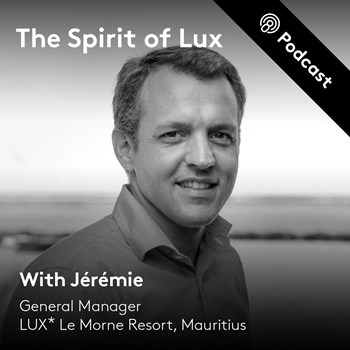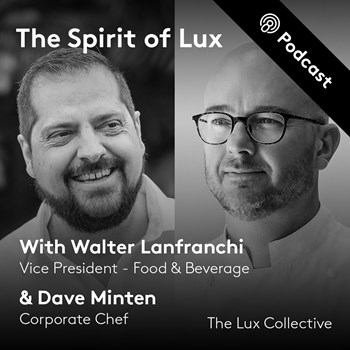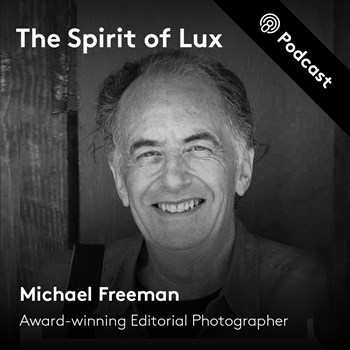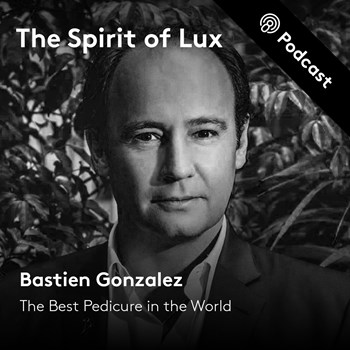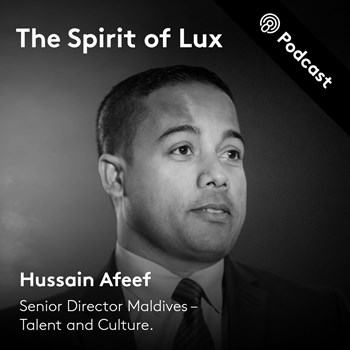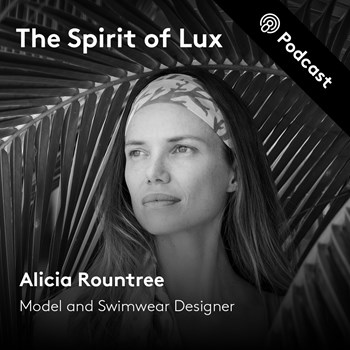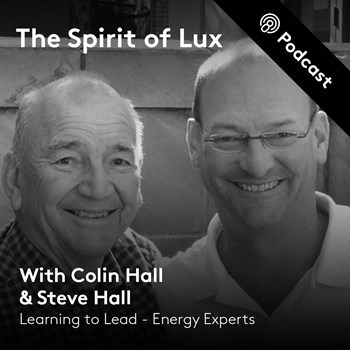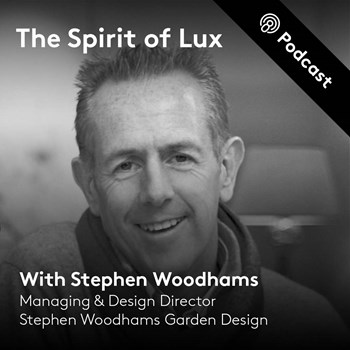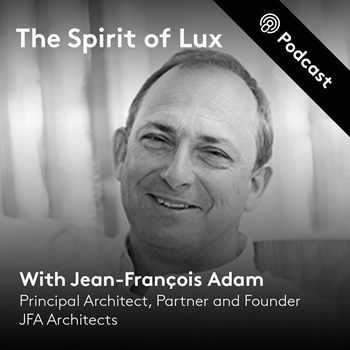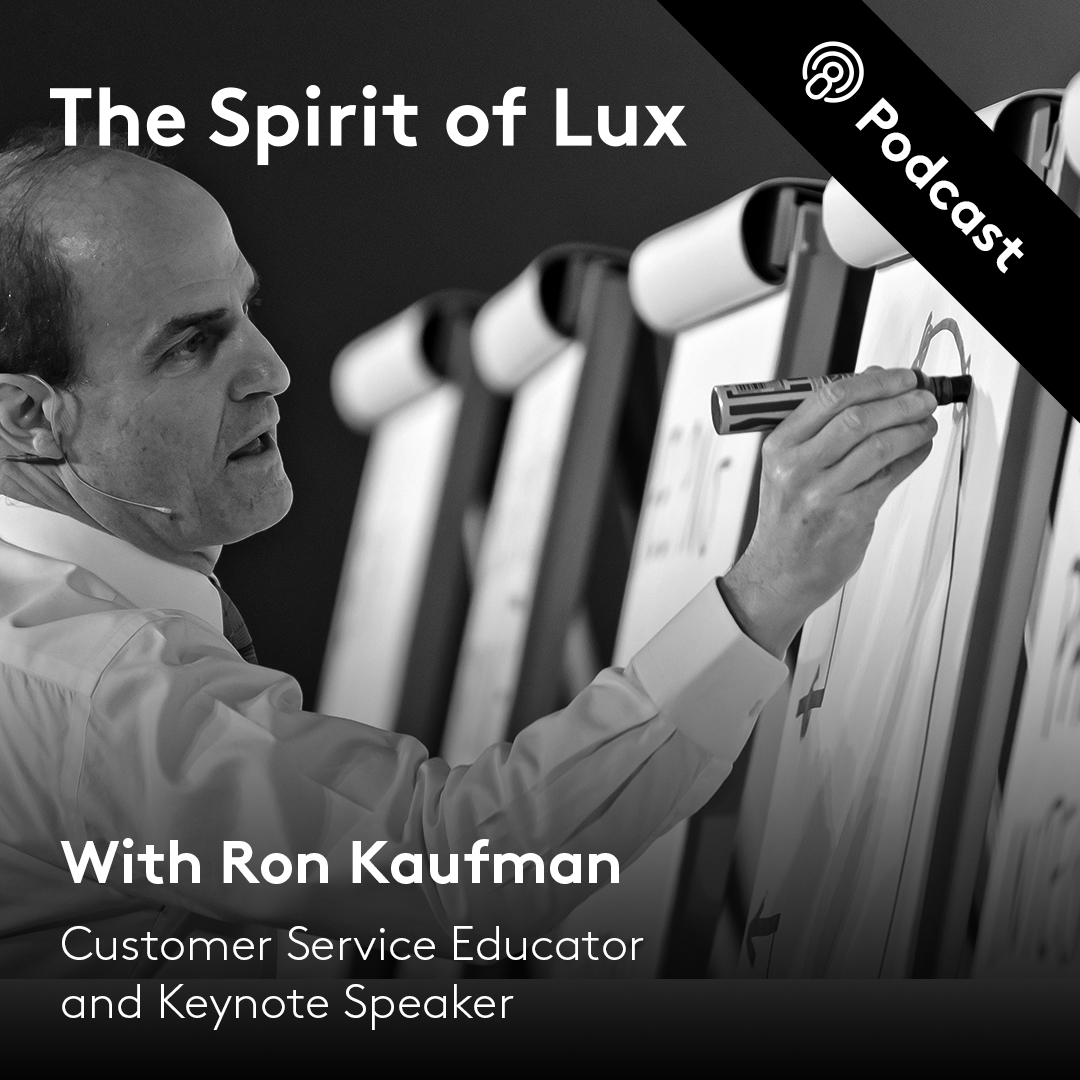 Paul Jones, CEO of The Lux Collective, chats with Ron Kaufman, a thought leader on customer experience and service culture development. Ron is a New York Times bestselling author and has penned 15 books, including the famous Uplifting Service. In the first episode of our travel podcast, we discuss the paradigm shift happening in the hospitality industry, whereby service providers have become caregivers in the post-COVID world.
Paul Jones, CEO of The Lux Collective, chats with Ron Kaufman, a thought leader on customer experience and service culture development. Ron is a New York Times bestselling author and has penned 15 books, including the famous Uplifting Service. In the first episode of our travel podcast, we discuss the paradigm shift happening in the hospitality industry, whereby service providers have become caregivers in the post-COVID world.
Careology and the Circle of Care with Ron Kaufman
Paul Jones: I’m Paul Jones and you’re listening to The Spirit of Lux.
Ron Kaufman: And so what LUX* did was said, we're not just going to provide excellent service. We're going to create a new level, a standard that is so high, that it's above all six levels that I had taught, and you created LUX* Shining Service.
Ron Kaufman: Paul, what connects the idea of service and the idea of care is the phenomenon of wellbeing.
Ron Kaufman: So I really think in this world of service that we're growing into all of us together on the planet. It's not so much who's the customer? Who's the provider? As it is, how do we flourish the service partnerships that we live in together.
Paul Jones: Welcome to the first episode of The Spirit of Lux. Today, I'm excited to have on the podcast one of the world's most sought-after educators, thought leader on customer experience and service culture development, and a very good friend of mine, Ron Kaufman. Ron is the New York Times bestselling author and has penned 15 books, including the famous - Uplifting Service. There's a lot to cover in this episode. The creation of LUX*’s shining culture. We make each moment matter. We care about what matters. The transformation of service to include care and the paradigm shift in the hospitality industry to adjust to the uncertainties. Good morning, Ron and welcome. This is the very first of our new series of podcasts and you are our inaugural guest for episode one.
Ron Kaufman: I am honored and delighted to be here with you. Thank you.
Paul Jones: Thank you for being with us. Ron, we've known each other for such a long time and for once we’re living and working in the same city, that city happens to be Singapore. So, tell us Ron, how is it that you’re now in Singapore.
Ron Kaufman: I came here 31 years ago to work on a project for one week for the Government of Singapore and Singapore airlines. The objective of which was to raise the service standards in the entire country. Of course, a week became two weeks, which became seven months, which became 31 years.
Paul Jones: And for us, it became 25 years because you've made such an enormous difference to every company that I've worked with, which is two companies. But the last company has probably been the most exciting and most interesting. And that company started out life as Naiade. When you first came to Mauritius to see the new company that I joined. So, tell us, Ron, how was that experience?
Ron Kaufman: Well, it was almost a tragic situation, Paul. It was the global financial crisis. You had nine properties. Occupancy was in the basement. The revenue was down on the floor. The business itself was on the verge of bankruptcy. And 3,200 team members were really traumatized. And then you came in, you joined the company as the new CEO and said, we can turn this thing around. We can make it work. Of course, we don't have any money. So how in the world are we going to stand out, attract guests, have a higher occupancy rate, earn a higher room revenue, how are we going to do that? It has to be done only entirely by service. And so, I think what you've always stood for came forward, like let's make this happen and your team believed you.
Paul Jones: Thank you, Ron. And of course, you're the world's leading expert when it comes to service. You have created this one, the wonderful educational tool, which you call the building blocks of service excellence. Tell us a little bit about that.
Ron Kaufman: Well, we have the foundation, imagine a house or a hotel that is the education about service that people don't actually learn in school. And yet, if you're going to go off to work, you're going to learn how to take action that creates value for someone else. And on that fundamental definition, we then put the building blocks of service culture, all the different activity areas that an organization actually needs to work with, and your company has done it just so incredibly well. And then of course, the roof of the house is the leadership behaviour. And so, what LUX* did was said, we're not just going to provide excellent service. We're going to create a new level, a standard that is so high, that it's above all six levels that I had taught, and you created LUX* Shining Service. And on that reputation, the brand LUX* was born, the experience was created, the travel industry noticed, and of course today you're dominating TripAdvisor because of the Shining Service culture that you've created.
Paul Jones: Thank you, Ron, of course your energy is legendary. You come in and you're able to lift up the spirits of each and every single team member that you interact with, and you don't forget anybody. You interact with thousands of people simultaneously either live as we did in those early days or even through the webcast that we've done during the recent times that we've all been going through. Tell us a little about that run.
Ron Kaufman: Well, you know, some of my background, Paul. I had a grandmother who taught kindergarten for 40 years and as I watched her with all these little sprites running around, she really taught me that every single human being deserves to be loved and encouraged and empowered and enabled. And I learned that when I was very young and then I got involved in ultimate Frisbee just when the field was first being created. And I took the sport all over the world, translated the rules, helped create players associations and festivals. And the first rule of the game is called the spirit of the game. There are no referees. The players on the field are responsible for the quality of play. And that really taught me that, you know, we're all in this together. It's not an opposition situation. We've got to learn to get along and support and encourage one another.
Paul Jones: Yes. And I can visualize you Ron, on stage where you have your famous 7 flip charts and you start at one end and you go from one end to the other end and you’re writing frivolously and you have this incredible neat writing, which enables you to graphically demonstrate the points that you're trying to get across to all of these people. How does that work?
Ron Kaufman: And carry them along, Paul. I'm literally creating a narrative so that from the beginning, they can look at something and say, “Okay, I understand the point you’re making and, on that point, this leads to this and this leads to that. And then if I look at it this way, it makes it even richer, etc.” So, for example, with your guests, when you say we make each moment matter, which was the beginning of the new LUX* brand. Then each moment starts from exploration and then registration, sales and then you've got the arrival and then you'd get them to the room. And for each moment it also means each guest. So you've got the mother and the father and the teenager and the little one. And so if your team is saying, ‘We’ that means every single person on the property, every team member. ‘Make’, that means we need to do something. ‘Each moment’ - that means every precious moment of time matter, then it matters to who? To the person whom we serve. And that's an example right there of building the narrative so that thousands of people can say, “I understand that, and I understand how I can put that into action.”
Paul Jones: And Ron, how well do you think the team at LUX* have done in actually delivering on that promise of making each moment matter?
Ron Kaufman: I think the reputation that the brand has in the industry answers that question. They've done spectacularly well, but it isn't just because they understand that particular principle. It's that you've literally built the entire culture around them. So, when you say, ‘We make each moment matter’, LUX* Shining Service, and then that evolved to ‘We care about what matters.’ That was really the transformation of the brand and the collective to what you're known for today. You as an organization, you as a CEO said, “We care about what matters”, which means we care about what matters to our guests, but we also care about what matters to our team members. We also care about what matters in the communities where our properties exist and where our team members come from. We care about the ecology and the sustainability of the entire industry. So, you've differentiated, you've created a huge conversational space in which every member of your team, I think, is extraordinarily proud to be on that team and play their part.
Paul Jones: Thank you, Ron. And how important do you think it is for each individual to start caring for themselves first? Not in a selfish way, but in order to equip themselves with the ability to care for others.
Ron Kaufman: Paul, what connects the idea of service and the idea of care is the phenomenon of wellbeing. So, with my definition of service is taking action to create value for someone. What makes it valuable? Somebody says, “I like it. You gave me something that I wanted. It made my life rich, or you contributed to my wellbeing.” Well, care is concern and commitment to someone's wellbeing. So then what wellbeing are we talking about in a commercial situation? It's your customer or in the case of hospitality, it's a guest. In medical care, it's a patient. We need the wellbeing of that person, your guest, all their family members, the wellbeing of our team members so we thrive in a successful culture. The wellbeing of the communities, so that the community is glad that our properties are located there. And who's at the core of all that? Each human being that points to the wellbeing of oneself. And that's where you're starting from and you're right.
Paul Jones: Our industry, the hospitality industry or tourism, is often known as the service industry and we're often termed as service providers. So, from what you're saying, Ron, we're no longer service providers. We are caregivers, care providers, which introduces a slightly different angle on what is expected from each and every team member and manager and executive in our industry.
Ron Kaufman: And owner and investor and travel agent and tour operator, right? We're all in this together. The idea of a service provider isn't quite accurate, I would say for the world that we're in and the world that we're developing. I'd call us all service partners, that there are things that we can do with, and for each other that make life work well. Back to my Frisbee spirit of the game. So, for example, the phrase customer service actually has two parts. One is the service provider, but the other is the customer. And that person can also take action that will create value for the wellbeing of the service provider. Giving a compliment, making a recommendation, pointing out something to a manager, giving a referral, telling a friend. So I really think in this world of service that we're growing into all of us together on the planet. It's not so much who's the customer? Who's the provider? As it is, how do we flourish the service partnerships that we live in together.
Paul Jones: This four letter word, Ron, care. C A R E - has become probably the most often used word in the last 16 months during this unfortunate experience of the pandemic. You have personally coined a new word around this four-letter word. What is that word? And tell us something about that, please.
Ron Kaufman: When I started studying service more than three decades ago, I realized there wasn't a good field of study clearly articulated. So, I ended up writing a lot in that area. About five years ago, when I got truly curious about the phenomenon of care, I went about studying it and I found two schools. One was healthcare, which made a lot of sense. And the other was philosophers who debated endlessly about this phenomenon of care? What does it mean? And how do we interpret it? Where does it show up in life, etc. And I said, “This is not very helpful for the man on the street.” If you will, for all of us as humans to say, wait a minute, what should I do? Why do I care? How do I take good care? Then you have to answer the question. What is care? And that's where I came up with the definition - cares, concern and commitment for future wellbeing. Okay. That's a phrase, that's a definition. But then as we start to explore, what does wellbeing mean? How do I express concern? How does someone demonstrate commitment? I realized there's this whole field that needs to be developed and taught. So, I looked at sociology and psychology and there's anthropology, but there wasn't a care-ology. And so, I invented the word.
Paul Jones: That is incredible
Ron Kaufman: Isn’t it?
Paul Jones: How do we study care-ology?
Ron Kaufman: I think we have to look at the fundamental question of what is it to be human. I think philosophers for years have gotten caught up in what is a human being like separate from everyone else, but that's not what being human is. So, when we say what is being human, we're biological, we're social, we’re historical or cultural or occupational, we're spiritual, we're ecological. And what I just said sounds like a long sentence, but imagine actually teaching this to young people so that they can locate themselves within the history of the world and the history of their lives and see, how am I going to contribute? How can I express my gratitude for all of the past that's brought me to this moment and live in a way that contributes to the future? And I think that's exactly what The Lux Collective is doing in the hospitality industry, where you're literally taking a stand for the wellbeing of every single person and community that you come into contact with.
Paul Jones: And Ron, do you feel care equates to being kind or is that just an attribute?
Ron Kaufman: That’s an attribute. There are certainly many times when kindness is absolutely appropriate. And there are times when being quite stern can also be incredibly caring. I remember one of my precious mentors said, “A well-grounded negative assessment is worth its weight in gold because most people won't give it to you.” And I think most of us can think back in life as where were those moments when someone drew the line and said, you stepped over it. Very valuable coaching, not necessarily delivered in the kindest manner because they might've had to break through and actually capture a moment of your listening.
Paul Jones: So we make each moment matter. We care about what matters. This was a journey of about three years for LUX* and you helped us articulate it. We have since created the circle of care. We have in fact produced a measurement system where when each guest departs, we'll ask them two simple questions, how are we doing on each one of those promises? And as you know, what gets measured gets done. So therefore, it is critical that we bring every single team member along with us. How do you think we are doing, Ron, as an organization in bringing every single team member along the journey?
Ron Kaufman: I think we have to look back and appreciate just how powerful the creation of the LUX* Shining Service culture has been and how effective. So that your team was already prepared. Then along came this Covid-ian era, this pandemic, which shocked all of us and shocked the industry, shocked communities, shocked families, shocked our biology, our practices. And I think your team was ready for some response that was other than suffering, some response that was other than resignation. And you literally stepped into that space with the care narrative and said, “Let us flourish this. Let us make this authentic and robust.” And some of the things which you can talk about better than I, that the properties have done within the communities have demonstrated that whether it's in the schools or it's in the health care, it's in the ecology of the environment. So, I think your team is not only grateful, but delighted to be part of the LUX* culture.
Paul Jones: So Ron, we have embraced the circular economy. We believe firmly in giving back and paying forward. This is so essential in order to create this, shall we say, a reputation for care? And as we go forward, we are realizing more and more that our guests are expecting a higher degree of care, a higher level of care. And they certainly have gone through a lot in this past and will continue as we learn to live with the virus. It's not going away as we know. So therefore, we have to learn to live with it and we have to be caring with each other, we have to be caring more when our guests arrive and give them the confidence to travel long distances to a place which they want to go to. They can't wait to come back to places like Mauritius or Maldives or La Reunion or wherever we're operating. They can't wait. And when they arrive, they want to be reassured that the welcome and the hospitality is infused with a high degree of care. So, Ron, how do you feel about other hospitality companies in the world? Have you seen any examples of what they're doing or other organizations in the world, whether it be hospitals that we can learn from in our industry? Have you seen anything that stands out for you and perhaps in the airline industry or we haven't flown a lot in the last year or so?
Ron Kaufman: But there is a very good example of that, Paul. I remember when the virus first appeared and Emirates started running advertisements saying when you fly with us, we will provide insurance coverage for you for a certain period of time after the flight, in case you find yourself afflicted, but that's extraordinary. What does that got to do with the flight or the airport or the ticket or the seat or the food onboard or the cabin crew? No, but they'd extended their sense of concern and care with their passenger into the future cares, concern and commitment for future wellbeing. I think in the hospitality industry, there's still far too many properties and brands that think the experience begins when you reach the property. And certainly LUX* has demonstrated by reaching out to our guests long, prior to their getting on the flight to arrive in the first place that we want to know who you are, tell us what your life, how's this vacation going to fit in with that, who you coming with, what do you hope you’ll experience while you're with us on the property? So that allows us then to do the preparations, to do the compassionate, preunderstanding so we can make each moment matter. Well, those moments begin still when the guest is at home. And it will endure after they go back home. So, you literally create this lifetime relationship so that the guests also care about the future of LUX* and that's the shared service partnership or care partnership or the future.
Paul Jones: Yeah. Ron, could you share with us what you've learnt during the last 16 months during the pandemic?
Ron Kaufman: Well, Paul, you know that for 29 of the past 31 years, I have been on more than 100 airplane flights every year. And I look back at that and I think how during that era, consuming jet fuel and zipping all over the planet and going from place to place. And in my case, having the privilege of stepping up on stage with a microphone and educating and entertaining thousands of people. That was really seen as a form of success. The world is changing and all of us are recognizing ecological impact. We're thinking much more carefully about where and when we want to be, should be. Is it pure personal indulgence or is its actual contribution in some way to our lives and the lives of other people? So when COVID settled me down here in Singapore, and I've been here now for 16 months, It also allowed me to focus all of that tremendous energy into a soundproof studio that I'd built inside of our home, but I built it there four years ago, not knowing that the virus was coming and it's now, you know, as you can imagine, quite filled up with microphones and cameras and screens and computers and lights so that I can continue to serve the world. And that has opened up the world in a very different way and has allowed me to do even deeper, more authentic culture building work in some very challenging areas. Hospitality and hospitals have an awful lot in common and I myself today doing a lot of work as you know, in the area of medical health and wellbeing, which I don't think I would have been able to do if I would be flying all over the planet.
Paul Jones: So, Ron, you've written all these books. I think 14 was the last number. You've been on the New York Times bestseller list. You've produced so many videos. You are an extraordinary educator full of energy. Would you consider yourself as a person who is always learning?
Ron Kaufman: Absolutely. And in fact, my investment in learning not only financially, but in terms of time has gone on for more than the three decades that I've been here. And I've been incredibly fortunate as you know, Paul to have precious, precious mentors who are philosophers and biologists and historians who really provoked me and have helped me recognize that our lifetimes aren't forever. And so what we do with our time here, it matters. It matters to ourselves and our experience of life, but it can also make a contribution to the wellbeing of other people. So the phrase, I think I've distilled it down to – ‘A life well lived, contributes to the wellbeing of others.’
Paul Jones: So would you say you learn every day?
Ron Kaufman: Absolutely. Every day and in fact, in every conversation, because each person I'm speaking with, they are a whole rich world, a whole history and a background of experience that I will never be, but I could become more appreciative of and more curious about.
Paul Jones: So during the pandemic, we had this wonderful experience where you ran 8 web casts with us, which were extraordinary. They were attended by hundreds of our team members consecutively in different countries. And you provided all this energy and this motivation for us all, to consider this four-letter word ‘care’. And how is it going to be applied to our provision of an experience when our guests return to our hotels, because at that time everybody was sitting at home, they weren't working in the hotels. But as we are now looking forward to the reopening of Mauritius, during the months of July, Maldives, La Reunion and China are already open. How do you think our team members are now prepared to face the realizations that they are now after such a long time back in the hotel and operating, but with this new paradigm of the virus, which we know is continuing?
Ron Kaufman: Well, there's the paradigm of the virus, but more importantly is the paradigm of care that you used the time while people were at home. Not to say, just sit and wait and come back to the hotel. I think you literally created an educational moment for people to think about what happens when we go forward into the hotel. How do we create what wasn't already there? We're not going back to work at the same place or with the same paradigm as you called it. We're going forward with our guests into a new world.
Paul Jones: So would you say that this has been a transformation process that we've gone through at LUX*?
Ron Kaufman: Certainly it looks like that for me, but it's a question I should actually ask you.
Paul Jones: I feel it is. I certainly see a renewed energy and vigor amongst all our team members. And when I consider that an entire hotel was re-imagined and refurbished by the very same team members themselves. This is the LUX* Le Morne where they all engaged in different facets of remaking that hotel. As a result, they have an investment of their, not just their hands, but their minds and more importantly, their hearts so that it's generated a spirit of pride and energy. And all of them I know are so excited to welcome the guests. Some particular those long standing as we call them in the business, the repeaters, they can't wait to show off what they've done, what we've done rather than what a contractor did or this one did. So, they invested themselves so much. And in fact, we will be talking about that on a podcast when we invite the general manager, Mr. Jeremie de Fombelle, who will be on a future podcast with us to talk about just that. He is a passionate man, and he was able to lead his team passionately along the way in that process. So, I think that I'm very pleased with where we have come. We certainly have a long way to go. I think that an often-used word also is mental health. You know, you can't but think that people who are confined to home for so long. They're largely inactive, although we try and keep them active and motivated and checking in, but there is a certain anxiety which is normal. So of course, I think that our team members have had a long period where they were uncertain when is this going to end? Oh, it's not going to end. It's going to continue. We have to live with it. We have to get vaccinated. We have to get our families vaccinated. We have to encourage our friends to get vaccinated. This is how we can live with the virus going forward. But I sense that they are very keen to get back in Mauritius to operating because we're hoteliers.
Ron Kaufman: We need guests
Paul Jones: We need guests in order to provide them with the cash
Ron Kaufman: and to be who we are as hoteliers.
Paul Jones: Exactly. We're very much in a people business.
Ron Kaufman: Can I respond to a couple of your points, Paul
Paul Jones: Certainly Ron
Ron Kaufman: one is you mentioned how the industry uses the term repeaters. And I would propose that that phrase is becoming obsolete. That no one really wants to go back and simply repeat what happened before, because we live our lives forward. And so, what you've done at LUX* Le Morne, as an example, as you've literally recreated a new opportunity, a new moment, a fresh new experience. And to the issue of mental health, we're not just minds, we're bodies, we're cultures, we’re families, we’re futures, we’re memories of our past, we’re dreams, we're broken dreams, all of us, we're human beings. And so, this idea of mental health and you're right, anxiety is a normal part of the human condition is resolved by being with others. I had a wonderful experience on my way here this morning to see you talking to my 92-year-old father in Seattle. My wife's about to go off to Australia. I'm in Singapore and our daughter is in New York. I said, dad, you know what, let's schedule it time where the four of us can all get on a zoom call together. And he was just over the moon, even imagining it to have his son, his daughter-in-law and one of his grandchildren all together on screens, but he could foresee a future social moment that gave him a sense of wellness. And I think all of us are now being called upon to not surrender and say, oh, I can't repeat the way I used to enjoy my social time and generate new ways of being with others.
Paul Jones: Absolutely. You talk about your 92-year-old father. I can talk about my four-year-old son who is also trying to educate me on the virus and it's incredible how his teachers have educated him on the virus and what he must do. He said, “Bubba, you must wash your hands. And we have the song that we sing when we wash our hands. So, we must be careful. So, you cannot go out, Bubba. No, don't go out.” So, he will tell me. And he has me in stitches, how serious he is, the way he talks about the virus. But I think it is important that the young ones are educated and that they know how to take care of themselves so that they can take care of their parents like me.
Ron Kaufman: And they're growing up in a very different time, Paul. The reality of ecological changes that will occur during their lifetime. They're not fools about that. They're not pretending it away. They're not saying it's a cost of doing business and we're just here to extract all the natural resources. I look for example, at one of your brands, SALT. And what you're doing at SALT of Palmar and the way in which the organic nature, not only of what's happening on the property, but what's happening for the guests when they're on the property, in the garden, in the kitchen, at the dining table. And that kind of an experience, I think, is an example of the rich invitation of your guests into the future, that they themselves will be living wherever they are in the world. And yet, where do you go to get that? You go to LUX*, you go to SALT.
Paul Jones: Absolutely. Ron, this is really so exciting and so interesting to hear you talk about care. Is there any other advice that you could give to our team members as we're conversing this morning?
Ron Kaufman: I think that the language of a good life for the past many decades has been quite selfishly oriented. You may remember the phrase ‘He who dies with the most toys wins.’ And of course it wasn't even assumed that it wouldn't be a he or toys, you know, or winning, just sort of a bizarre obsolete way of orienting who's got the biggest car or the bank account, etc. And we're realizing today more and more that what really matters to give one's own sense of living and being [inaudible] a joy isn't what I get. It's what I'm able to give. It's the contributions I can make. It's the generosity that I can demonstrate whether it's in a smile or a friendly eye contact or it's something much more deliberate. And that would be the piece of advice that ‘A life well lived contributes to the wellbeing of others.’
Paul Jones: Well, thank you very much. And as we go forward, Ron, we're excited as we venture out with more LUX* hotels or Tamassa hotels or SALT hotels, we are, as you know, operating in China, we have this wonderful series of boutique hotels along the LUX* Tea Horse Road, which is so exciting and in a way, very spiritual because you connect with the mountains and the temples, and you seem to go back in time as you see, and you feel, and in you experience this wonderful tea culture along the Tea Horse road. And we recently opened a property in the Guangxi province and this property LUX* Chongzuo, it's just quite remarkable. It has these wonderful limestone peaks. When you look outside from your bedroom or as you arrive in the lobby, you see these peaks and you see this waterscape and the peaks reflected into the waterscape and we have had such a positive reaction from the public in China to the launch of this hotel. Because we found that people are looking for just that. They want to indulge their senses. The sense of the visual, the sense of the sound. What do you sense as you smell the freshness of the air around you and engaging with the senses we found has been so provocative in creating this need that people have and fulfilling the need for them to engage their senses. And we've just been booked up
Ron Kaufman: and you will continue to be in. It's not a surprise that the brand is called Tea Horse. Tea is agricultural. Horse is animal. We are of that. We, human beings need nature. We are natural creatures. Now the world in which we grown would have us believe that we're commercial creatures, we're consumers or we're service providers, more mechanical or scientific or capitalistic and yet fundamentally we are organic. And your Tea Horse Road or the natural experience at SALT and the other experiences that people have at your other properties bring us back to indulging, as you said, in what we really are.
Paul Jones: So Ron, as we grow the organization, as we grow the footprint of LUX* and the different brands around the world and we have ambitions to grow steadily, not too quickly because we want to absorb our growth as we go along. We are so determined to breathe life and to, we make each moment matter. And we care about what matters, what matters. This is so critical. We are firmly anchored in what we call experiences. We provide experiences for our guests. So when they come, they don't just stay in a hotel room, but they come for that special experience that we can offer them in different ways and they can switch off and do nothing if they wish. But more frequently, we find our guests are looking to be active in the experiences that we provide them with. But all of this has to have this common denominator of the combination of service that we call Shining Service and then the transformative word of care, but care, not just as a throw away word, but care with meaning and caring about oneself, caring about our guests, caring about our team members, caring about our neighborhood, our community. In fact, often we've found that our hotels are very fundamental in creating the spirit of the community. And we do that in so many ways. You heard me talk earlier of that phrase, the circular economy, and that is so critical that we enable the immediate community and the broader community at a more national level. The beneficiaries of what we're doing.
Ron Kaufman: Paul, I would say from that perspective, that LUX* and The Lux Collective is really at the beginning of the next phase of a phenomenal contributory journey. That, how you're already respected and perceived is not a tagline that was made up. It's a culture that was built from the ashes from Naiade into LUX* resorts, which grew to Shining Service, which became the foundation for The Lux Collective, which is now expressing we care about what matters and enabling entire communities to thrive because a LUX* property has been located in the community and that's influencing employment, but also education, but also ecology and respect and reputation and appreciation from others around the world for the location in which a LUX* property exists. I think you're just at the beginning of a contribution to humanity that will outlive us both and enable generations to come.
Paul Jones: And that's what keeps both of us so high energy and wanting to keep going and contributing to the wellbeing of all the team members that work with LUX*
Paul Jones: Thank you for listening to The Spirit of Lux with me, Paul Jones. If you like what you heard, don’t forget to subscribe to our channel on Apple Podcast, Spotify or wherever you listen.

